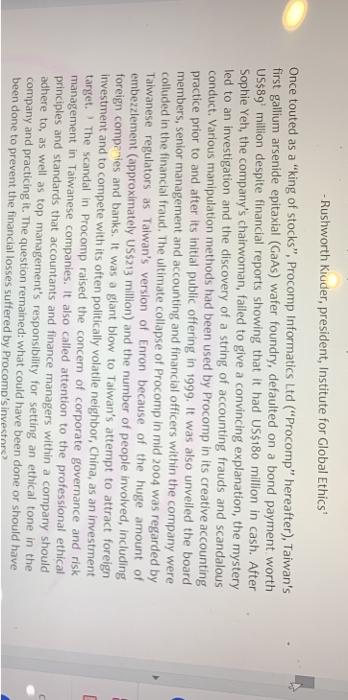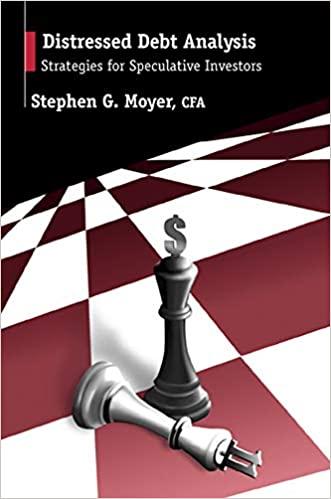- Rushworth Kiuder, president, Institute for Global Ethics Once touted as a "king of stocks", Procomp Informatics Ltd ("Procomp" hereafter), Taiwan's first gallium arsenide epitaxial (GaAs) wafer foundry, defaulted on a bond payment worth US$89 million despite financial reports showing that it had US$180 million in cash. After Sophie Yeh, the company's chairwoman, failed to give a convincing explanation, the mystery led to an investigation and the discovery of a string of accounting frauds and scandalous conduct. Various manipulation methods had been used by Procomp in its creative accounting practice prior to and after its initial public offering in 1999. It was also unveiled the board members, senior management and accounting and financial officers within the company were colluded in the financial fraud. The ultimate collapse of Procomp in mid 2004 was regarded by Taiwanese regulators as Taiwan's version of Enron because of the huge amount of embezzlement (approximately US$213 million) and the number of people involved, including foreign companies and banks. It was a giant blow to Taiwan's attempt to attract foreign investment and to compete with its often politically volatile neighbor, China, as an investment target. The scandal in Procomp raised the concem of corporate governance and risk management in Taiwanese companies. It also called attention to the professional ethical principles and standards that accountants and finance managers within a company should adhere to, as well as top management's responsibility for setting an ethical tone in the company and practicing it. The question remained: what could have been done or should have been done to prevent the financial losses suffered by Procomp's investore [ - Rushworth Kiuder, president, Institute for Global Ethics Once touted as a "king of stocks", Procomp Informatics Ltd ("Procomp" hereafter), Taiwan's first gallium arsenide epitaxial (GaAs) wafer foundry, defaulted on a bond payment worth US$89 million despite financial reports showing that it had US$180 million in cash. After Sophie Yeh, the company's chairwoman, failed to give a convincing explanation, the mystery led to an investigation and the discovery of a string of accounting frauds and scandalous conduct. Various manipulation methods had been used by Procomp in its creative accounting practice prior to and after its initial public offering in 1999. It was also unveiled the board members, senior management and accounting and financial officers within the company were colluded in the financial fraud. The ultimate collapse of Procomp in mid 2004 was regarded by Taiwanese regulators as Taiwan's version of Enron because of the huge amount of embezzlement (approximately US$213 million) and the number of people involved, including foreign companies and banks. It was a giant blow to Taiwan's attempt to attract foreign investment and to compete with its often politically volatile neighbor, China, as an investment target. The scandal in Procomp raised the concem of corporate governance and risk management in Taiwanese companies. It also called attention to the professional ethical principles and standards that accountants and finance managers within a company should adhere to, as well as top management's responsibility for setting an ethical tone in the company and practicing it. The question remained: what could have been done or should have been done to prevent the financial losses suffered by Procomp's investore [







